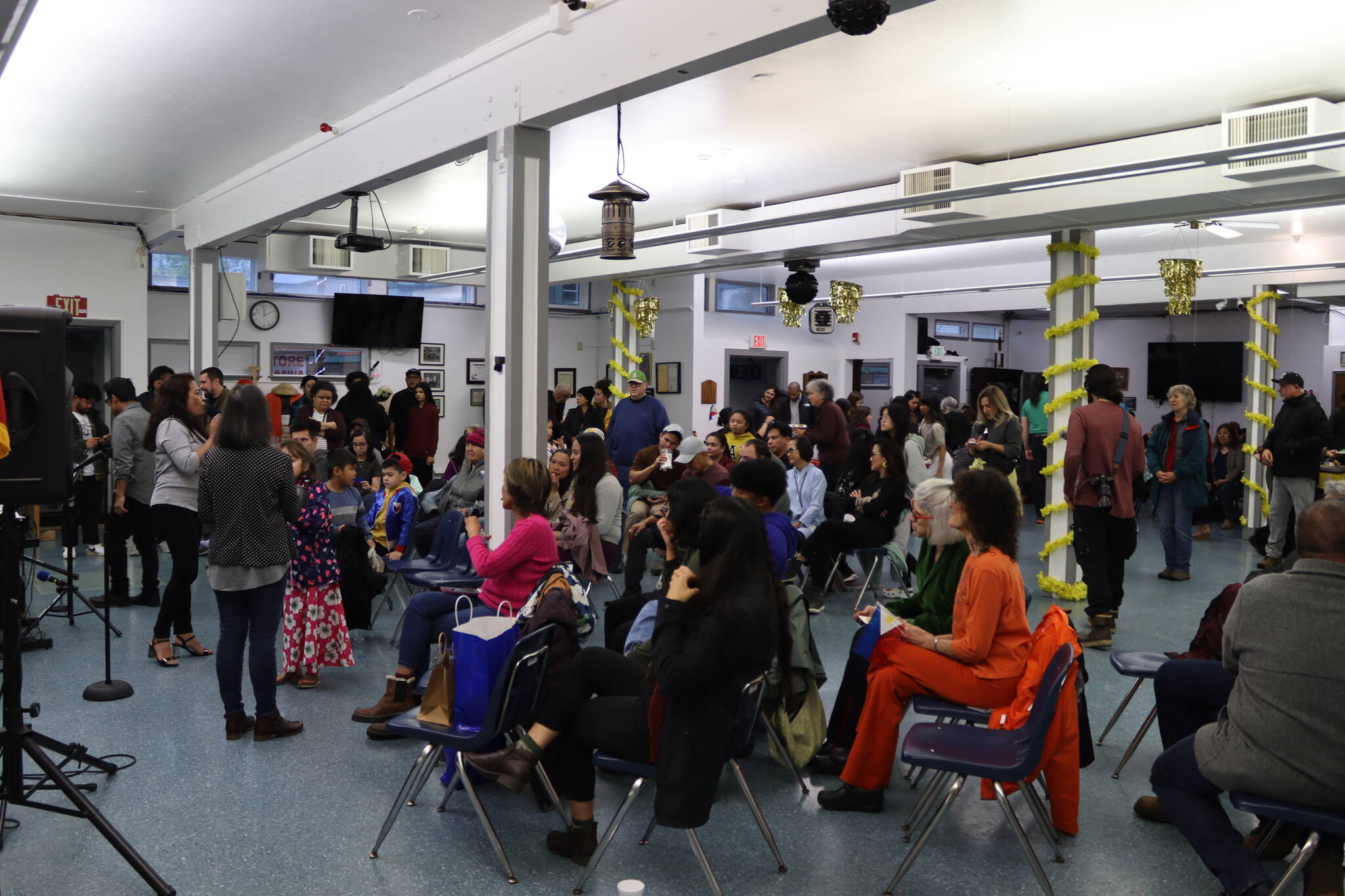This story has been updated with additional information.
There are so many aspects to the two-day Filipino Community Celebration that kicked off downtown on Saturday it may be hard to believe it’s just one of three parts of a larger project.
Hundreds of people came through Juneau’s Filipino Community Hall at 251 S. Franklin St. to take in museum-quality displays, peruse photo scrapbooks, watch performances, and nosh on authentic Filipino cuisine created by some of Juneau’s best chefs. More of the same is planned for Sunday with a community potluck featuring games for kids and other activities beginning at noon.
The event and the project — which includes a podcast and a museum exhibit — were overseen by executive producer Tasha Elizarde. It is a collaboration between KTOO, where she works as a community engagement producer, the nonprofit FILCOM Inc., which owns the hall and holds historical assets of the local Filipino community, and the Juneau-Douglas City Museum.
The event featured different workshops and performances, including Ati-Atihan drumming and live music from Theater Alaska. There were workshops on dancing and martial arts, and games for children.
The biggest hit might have been the food, which was presented on Saturday as a merienda table. A dozen different kinds of foods were spread out including lumpia, a type of fried egg roll, bola-bola meatballs, two kinds of hot dogs and lots of fruits.
The kitchen was overseen by Rachel Carrillo Barril, who works at In Bocca Al Lupo and also serves on FILCOM. Barril noted that confections, which included a dessert of fresh silken tofu and tapioca balls in a brown sugar syrup, were courtesy of Melvin Cristobal.
Beth Weigle, director of the city museum, said the introduction of a bill to establish October as Filipino American History Month in Alaska by state Rep. Genevieve Mina, an Anchorage Democrat, was key. Mina’s bill was passed in May and she was in attendance on Saturday. The same designation was passed nationally by Congress in 2009.
But it took Elizarde to bring the project to life, Weigle said. The KTOO reporter and recent college graduate first approached the museum director about a year ago with the idea for a Filipino history project. By January they were talking about what it would entail.
It was a good match from the start. “We’re a community museum and part of the city,” said Weigle, “Part of our mission is to help tell the diverse stories of our community.” There was a variety of fundraising that happened from there to fund the effort.
Elizarde credited Dara Lohnes-Davis, curator of collections and exhibitions at the city museum, with helping her sort out how to curate the project. She said she was grateful to KTOO, which gave her the time to turn the project into something bigger than it might have been otherwise.
Evidence of the work was all around the hall on Saturday, with displays of Filipino costumes, sports memorabilia and tables covered with photo albums. Signs on the tables encouraged visitors to go through the books to see if they recognized anyone. Labels were nearby.
Elizarde said she spent a lot of time going through archival material that belongs to FILCOM. The hall is run by volunteers and a lot of time was needed to organize things, a process that played out over months. She didn’t want to just cull from what was there.
“The intention was to create a resource that could be shared,” she said. That starts with the Filipino community in Juneau, but extends more broadly to educators and others to ensure more people know about the significance of the community.
Elizarde also reached out to a lot of people to help. One of them was Kaye Roldan, whose artistic contribution is a series of photographic portraits she called “mestizo and mestiza stories,” which are part of the exhibit at the museum.
“If we go back into the history of the establishment of the Filipino Community Hall, a lot of the Alaskeros that came from the Philippines married Alaska Native women, and the Alaska Native women and the Filipino husbands would fundraise to produce money to later buy the hall and the expenses,” she said. “We didn’t see much of that in the community, so I wanted to highlight their stories and their contributions, and also what it is to be mestizo in the community, which allowed me to take portraits and also interview them on their experiences.”
That experience inspired Roldan to get more active with the hall and she joined the board. Among her other contributions to the event was organizing the children’s table, which had educational games that taught about the contributions Filipinos have made to different industries, like mining and canning.
Elizarde and Roldan both grew up coming to the Filipino hall. They loved the sense of community and wholesome fun, particularly around the holiday season. In recent years, thanks in part to COVID-19, fewer people have been involved with the hall. Both said this event is just the start to bringing them back.
“The FILCOM hall accepts everyone from the community for membership,” Elizarde said.
• Contact Meredith Jordan at meredith.jordan@juneauempire.com or (907) 615-3190.

